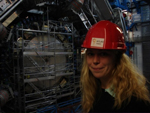UCL Ph.D Student Profiles
Sally Shaw
Sally Shaw completed her PhD in December 2016, working on understanding the nature of the Dark Matter that makes up 85% of the mass of the Universe. Dark Matter, yet to be observed directly, may be comprised of Weakly Interacting Massive Particles, or WIMPs. Sally conducted research with the LUX experiment, operating a xenon filled time projection chamber 1.5 km underground in a former gold mine, seeking to detect the faint and rare signatures expected from WIMP interactions in the xenon target. Sally lead areas of the analysis that picked out and characterised very-low energy events in the data, contributing to final results from LUX in 2016 that set world-leading constraints on WIMP-nucleon interactions; pushing a factor 20 times further into electroweak parameter space in the search for Dark Matter. Sally also worked on Monte Carlo simulations for LUX’s successor experiment, LZ, that is presently under construction. LZ will be some 100 times more sensitive than LUX and Sally worked on the crucial background model to ensure the design and construction of the experiment would meet science goals.
Sally was involved in several public engagement activities at UCL, including Soapbox Science (watch here), the UCL Your Universe festival, the "Secret Cantina" for the Star Wars Secret Cinema, a poster presentation to MPs at the Houses of Parliament for the SET for Britain competition, and appearing on BBC's flagship news programme, Newsnight. Sally tweets as @agirliknow
After completing her PhD, Sally accepted the offer of a post-doctoral researcher to continue working on LZ with the group at University of California Santa Barbara alongside the project spokesperson.
Adam Davison
 Adam Davison completed his PhD on the ATLAS experiment, preparing to search
for the Higgs boson. Some of his exploits have been captured in a series of movies:
Colliding Particles.
After completing a postdoctoral position at UCL, Adam moved to a tech startup and is now the Head of Insight and Data Science at The Economist.
Adam Davison completed his PhD on the ATLAS experiment, preparing to search
for the Higgs boson. Some of his exploits have been captured in a series of movies:
Colliding Particles.
After completing a postdoctoral position at UCL, Adam moved to a tech startup and is now the Head of Insight and Data Science at The Economist.
Lily Asquith
 Lily Asquith also completed her PhD recently, working on the ATLAS experiment.
In an event at the Science Museum,
Lily explains
why the start-up of the Large Hadron Collider was such an
exciting - and safe - event. After completing a postdoctoral position at the
Argonne National Laboratory in the USA, Lily now holds a Royal Society Dorothy Hodgkin Fellowship at the University of Sussex.
Lily Asquith also completed her PhD recently, working on the ATLAS experiment.
In an event at the Science Museum,
Lily explains
why the start-up of the Large Hadron Collider was such an
exciting - and safe - event. After completing a postdoctoral position at the
Argonne National Laboratory in the USA, Lily now holds a Royal Society Dorothy Hodgkin Fellowship at the University of Sussex.
